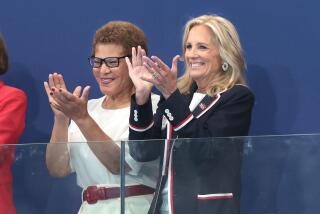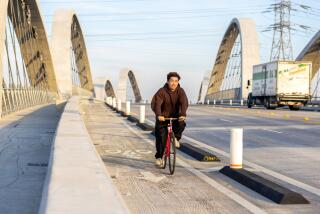Deukmejian Says a Little Ride-Sharing Will Go a Long Way to Curing Congestion
- Share via
Gov. George Deukmejian made another pitch for ride-sharing in Los Angeles on Friday, saying increased car-pooling offers the best chance to bring immediate relief to traffic congestion.
Deukmejian said that if drivers can learn to share rides, even only a couple of times a week, “we can virtually eliminate congestion.”
The governor offered statistics showing that on average there are six commuters for every five cars during peak rush hours, or about 1.2 people per vehicle. He said the congestion problems could be solved if the occupancy rate were increased to 1.4 people per car.
But Deukmejian said Californians are reluctant to change their life styles and give up the exclusive use of their cars.
“We’ve got a big selling job to do in California,” the governor told a group of radio traffic reporters and government officials from law enforcement and transportation agencies during a meeting in Los Angeles.
At the meeting, Commuter Transportation Services Inc., which operates Commuter Computer, reported that a telephone survey of 500 randomly selected commuters from Los Angeles, Ventura, Riverside and San Bernardino counties found that 83% drove to work alone during 1988. The survey showed that 11% of commuters used car pools, 2% walked or rode bicycles to work, 2% used buses, 1% rode motorcycles and 1% used some other form of transportation, such as rail.
Asked whether traffic on the way to work was worse than a year ago, 72% said it was, 23% said it was the same and only 5% noted an improvement.
Deukmejian is supporting efforts to put together a ballot measure in November that would raise $20 billion over 10 years through a combination of gasoline tax increases, the sale of bonds and increases in truck weight and other motor vehicle fees. The gasoline tax proposal calls for an immediate increase of 5 cents per gallon, followed by 1-cent increases in each of the next four years for a total of 9 cents. The money would be spent primarily for highway construction but would also include a variety of other transit projects.
But Deukmejian said the new money, even if it gets voter approval, will not fully solve the traffic congestion problem.
“We are never going to be able to build our way out of the problem,” Deukmejian said.
After the meeting, Deukmejian told reporters he thinks the gasoline tax ballot measure, once it takes shape, should be limited to transportation funding.
Since the state is expected to be within about $100 million of the voter-approved spending limit when the 1989-90 fiscal year begins July 1, voters will be asked to increase the limit along with the gas tax.
Some Democratic legislators would like to broaden the ballot measure to include authority to raise the limit on all government expenditures, not just those involving transportation.
But Deukmejian said a ballot proposition providing for a general lifting of the limit would make the gas tax proposal “more difficult to pass because voters would be asked, in effect, to lift the spending limit and then to trust the Legislature in terms of how the additional monies would be spent.” Deukmejian said voters would be likely to jump to the conclusion that lawmakers next would push for a general tax increase to raise new revenues in order to reach the new higher spending limit.
More to Read
Sign up for Essential California
The most important California stories and recommendations in your inbox every morning.
You may occasionally receive promotional content from the Los Angeles Times.













